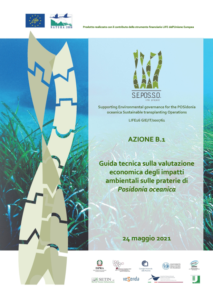Action B.1: The governance process of Posidonia oceanica transplantation in Italy
This actions aims to analyze the Governance process that rules the Posidonia oceanica transplantation operations, especially when these are indicates as a compensations of a damage in the whole of the Environmental Impact Assessment (EIA). The analysis will allow to understand interactions between the various elements of the EIA process and the stakeholders involved, filling any gaps in the application of the EIA procedure. Furthermore, any conflicts that can contrast the achievement of the results of an optimal Governance and proposed more efficient and effective processes in compliance with the European Union Environmental Directives on Environmental Impact Assessment (EIA-2014/52/EC) and on Planning of the Maritime Space (MSP-2014/89/EU). Through the analysis of three case studies, in which Posidonia were transplanted were as a compensation measure after different anthropic impacts, Piombino (Tuscany), Ischia (Campania) Civitavecchia (Lazio) and the Augusta case study (Sicily ), in which a transplant was carried out on a voluntary basis with the aim to recover the pre-existing Posidonia habitat, this action has clarified about:
- the EIA process carried out and the verification of compliance
- the legal and administrative aspects related to the implementation of P. oceanica transplants
- the main stakeholders involved in these works and in the EIA processes
- possible conflicts between the actors involved
- the ecosystem services provided by the P. oceanica prairies and the consequent implications in terms of the economic evaluation of the environmental impacts at local level
In addition to these 4 cases, during the Project have been considered further study cases in which transplantation activities have been carried out as a compensation measure or for different purposes (e.g. restoring).
Guide to Posidonia oceanica Ecosystem Services
Ecosystem Services are the contributions of the ecosystem structure and functions (in combination with other inputs) to human well-being. This means that humanity is highly dependent on the proper functioning of ecosystems and on Natural Capital, which are the basis for a constant flow of ecosystem services from nature to society. Posidonia oceanica meadows provide many important ecosystem services, such as habitat creation and maintenance, water quality regulation, food and nutrition supply, climate regulation. When Posidonia oceanica meadows are affected by human activities, their ecosystem services can be degraded, with possible reduction of their contributions to human well-being, also in economic terms.
Life SEPOSSO prepared a “Technical Guide on the economic evaluation of environmental impacts on Posidonia oceanica meadows“, based on the paradigm of ecosystem services. The main objective is to support the elaboration of technical documents in the context of the Environmental Impact Assessment and the Appropriate Assessment sensu Habitat Directive, with the aim of contributing to the governance of these processes.
Technical guide for economic assessment of environmental impacts on Posidonia oceanica meadows (ENG)

